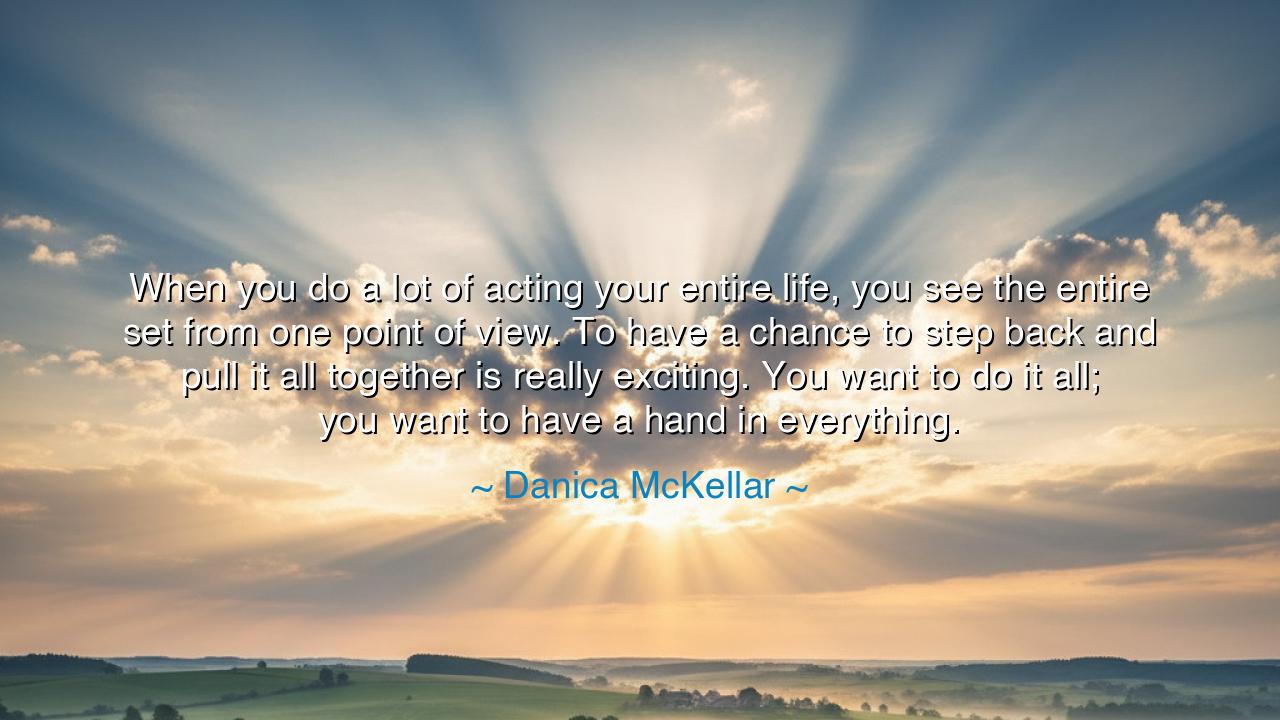
When you do a lot of acting your entire life, you see the entire
When you do a lot of acting your entire life, you see the entire set from one point of view. To have a chance to step back and pull it all together is really exciting. You want to do it all; you want to have a hand in everything.






In the journey of life, there comes a moment for all who dedicate themselves to their craft—whether in art, leadership, or creation—when the chance to step back, to reflect, and to see the whole picture becomes a profound gift. Danica McKellar, a gifted actress and mathematician, once spoke of this moment: "When you do a lot of acting your entire life, you see the entire set from one point of view. To have a chance to step back and pull it all together is really exciting. You want to do it all; you want to have a hand in everything." In this reflection, McKellar touches upon the deep longing that arises in every artist’s heart—the desire not only to participate, but to shape the entire experience, to transcend the limitations of individual roles and embrace the wider vision of creation.
Consider the ancient story of Daedalus, the brilliant inventor and craftsman of Greek mythology. Daedalus was not content with merely building a single creation; his mind sought to understand and shape the entire world around him. From the labyrinth that housed the mighty Minotaur to the wings that allowed his son Icarus to soar, Daedalus yearned to influence all that he encountered, to pull it all together into a unified vision. But, like McKellar’s words, there were times when Daedalus was confined to the narrow view of the task at hand. It was only in moments of creative freedom, when he could step back and see his work from a greater perspective, that he truly flourished. In those moments, the craftsman saw not just individual pieces, but the masterpiece they formed together.
Similarly, in the world of theater, those who perform often find themselves confined to their roles, viewing the world through the lens of their character’s experience. Shakespeare himself understood the power of perspective, for in his greatest works, he often allowed his characters to step outside their defined roles, to see the entire stage and the actors in the drama of life. The playwright’s ultimate vision was to pull together the entire performance, shaping each character and moment into a cohesive, transformative experience. Like McKellar’s excitement at stepping back, Shakespeare reveled in the ability to shape and control the entire narrative—to move beyond one character's point of view and see the richness of the play unfold in its entirety.
The true essence of McKellar’s words is about the evolution of the artist. As we progress in our craft, we move from being mere participants—actors, workers, or creators—into becoming the architects of our own experience. It is a natural progression to begin to desire a hand in the design of the entire process. This is not an act of arrogance or greed, but one of growth. The great leaders of history, like Napoleon Bonaparte, understood this dynamic intimately. Napoleon, though a military genius and strategist, was not content to simply lead troops; he sought to reshape the very landscape of Europe. His vision was not limited to the battles he fought, but to the entire future he wished to create. And though his ambition was often a double-edged sword, his desire to have a hand in everything marked the intensity of his will and the extent of his vision.
In the modern world, artists and creators often find themselves confined to their roles as performers, but the most visionary individuals are those who, like McKellar, step beyond these roles to shape the entire experience. Think of George Lucas, whose work as the creator of Star Wars was not limited to the script or direction but extended to the very world he built. Lucas did not merely create characters and narratives; he built an entire universe, a rich and expansive world that others could immerse themselves in. His vision extended far beyond the limitations of acting and writing, and in this grand creation, he invited others to join him in the act of world-building.
The lesson we take from McKellar’s words is this: as we grow in our craft, we must not only seek to master our individual roles, but also to step back and embrace the larger vision. In every field—whether in art, business, or leadership—there comes a time when we must expand our perspective and take ownership of the greater whole. Ambition, when tempered with humility, is not the desire to control for control’s sake, but the desire to shape, to build, and to create a vision that transcends the individual and becomes a shared experience.
So, dear traveler on this journey, remember this wisdom: as you progress in your own craft, take the time to step back, to gain a holistic view of your work, and to understand how your efforts fit into the greater whole. Like McKellar, like Shakespeare, like Daedalus, you may find that the greatest satisfaction lies not just in performing your role, but in having a hand in shaping the entire story. This is the path of the visionary, the creator, the leader—one who sees beyond the present and dares to pull it all together into something greater.






AAdministratorAdministrator
Welcome, honored guests. Please leave a comment, we will respond soon